Centered Self: Systems Change from the Inside Out
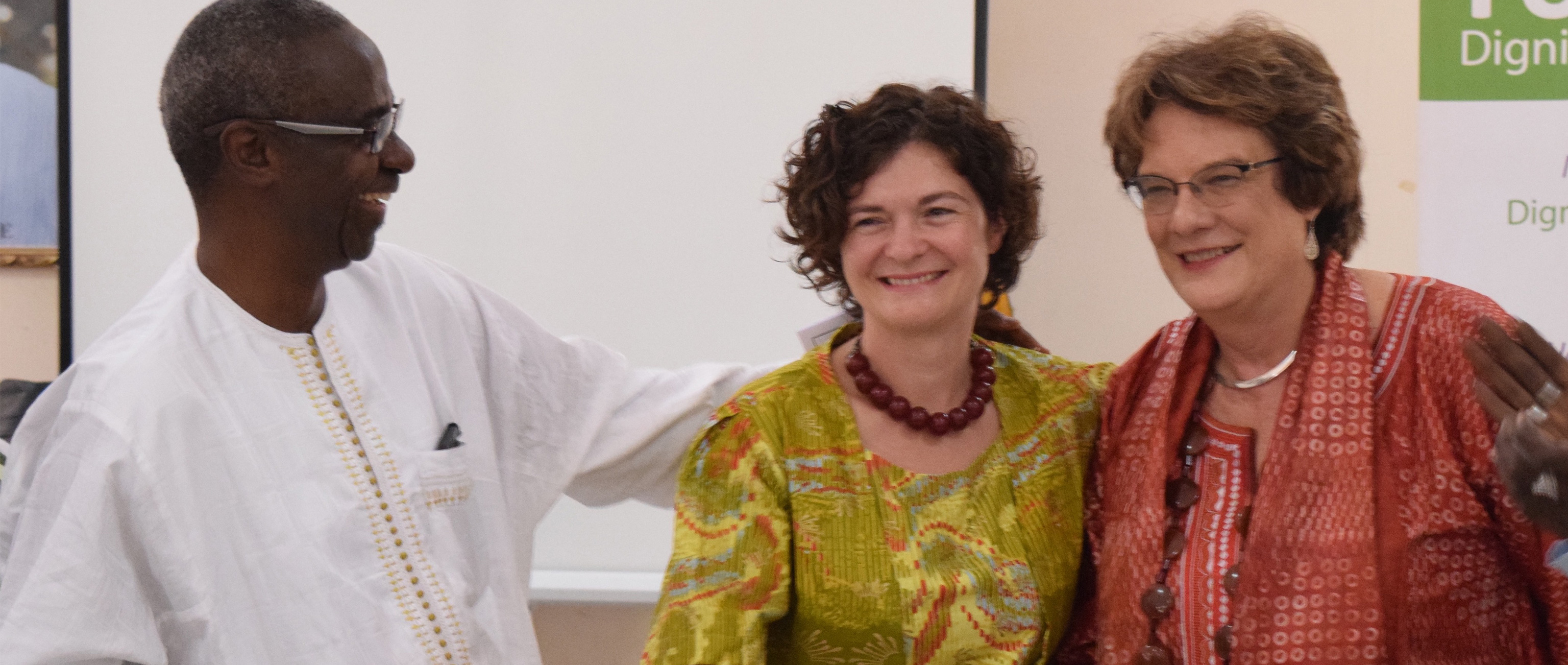
For nearly three decades, Tostan has co-created and implemented human rights based-educational programs with communities across the African continent that inspire large-scale movements leading to dignity for all. Founder of Tostan, Molly Melching, came to Dakar, Senegal in 1974 as a graduate student and never left, putting down the deep roots required to work on community-led, transformative social change. She created Tostan and served as CEO for 27 years until 2017 when Elena Bonometti was welcomed as her successor through a collaborative model of transition where Molly moved to the new position of Founder and Creative Director. In late July 2020, we asked Elena and Molly to take some time to reflect with us on the intersecting themes of wellbeing and the transition process they went through. What follows is an edited version of that conversation.We began by inviting Molly to share how she has come to think about the transition in relation to her own wellbeing.
Molly Melching: For many years, the three-year Tostan participatory education program—called the Community Empowerment Program—has used the promotion of community wellbeing as a framework for our development work. We’ve focused at our organization for almost 30 years on supporting community members to collectively identify what community wellbeing means and looks like for them. We let them know that our goal is supporting them in achieving their vision of wellbeing—not trying to impose what our vision of wellbeing should be for them.
While implementing our program in thousands of communities over the years, we’ve been mainly focused as an organization—and me on a personal level—on emphasizing this community wellbeing. Unfortunately, I think that for a long time we didn’t pay enough attention to the wellbeing of our own Tostan staff and to our personal wellbeing—not only our physical wellbeing—but also our social, psychological, spiritual, and environmental wellbeing.
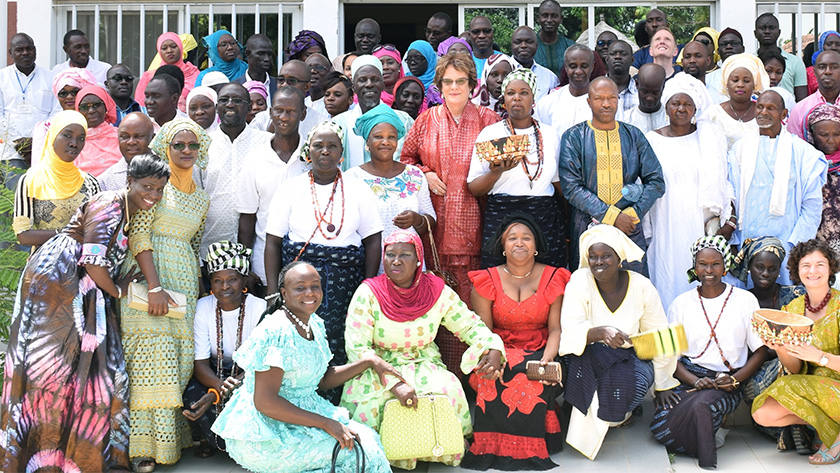 Tostan staff, board members and community participants at the October, 2017 torch-passing event in Senegal, celebrating both Molly and Elena as they transitioned to new roles in the organization.
Tostan staff, board members and community participants at the October, 2017 torch-passing event in Senegal, celebrating both Molly and Elena as they transitioned to new roles in the organization.
When I attended the individual wellbeing retreats, I was nearing that “normal” age at which many people retire. It was during those retreats that I started realizing how important it is to intentionally work not only the wellbeing of our partner communities, but also on my own wellbeing and that of the many staff who work long hours at Tostan, both at our national offices and in the field, to support the success of the program in remote and resource-poor communities where we work. I had never really made time to tend to my own personal wellbeing and I had to admit that as such, I had not been a good role model for the rest of the staff.
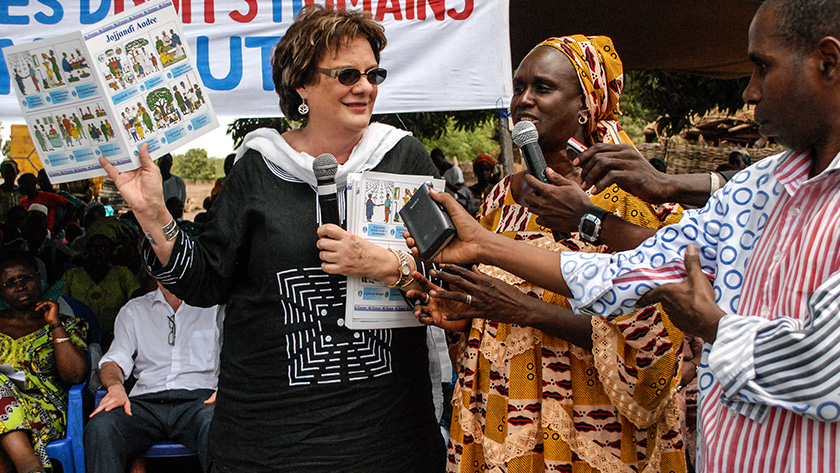 Molly Melching congratulates community members on their awareness-raising event to promote peace and security in the Kolda region of Southern Senegal.
Molly Melching congratulates community members on their awareness-raising event to promote peace and security in the Kolda region of Southern Senegal.
It had been 25 wonderful years of working with communities—not only in six countries in West Africa, but also in Somalia and Djibouti. That meant traveling a great deal and navigating lots of very difficult situations. In 2015, I was 65 and I’d never even thought about retiring; however, I knew that it was critical to prepare Tostan for the future by bringing in new and innovative leadership. It was a perfect time to suggest to our Tostan Board of Directors that we search for a new CEO. I hoped to find someone who would allow me to continue my work with Tostan by focusing mainly on the programmatic aspects which I have always loved the most. The members of our Board were wonderful and without their support, we would not be where we are today.
I was thrilled when we found Elena because I saw that she shared Tostan’s values and, given her rich experience, I believed she would be able to grow the organization and scale our program to reach even more communities and the many countries requesting our model. I also knew that I could hand over the leadership and concentrate on program development and training which gives me so much joy. It has been a great experience because we complement one other and respect each other’s special talents.
Recently, Elena and I had the opportunity to participate in a two-year program for organizational wellbeing created for NGOs similar to Tostan during which we recognized the need to more clearly emphasize the importance of attending to the wellbeing of our staff. We developed seminars patterned after the work we do in communities to make it clear that wellbeing was a priority for Tostan—still at the community level, but now also at an individual and organizational level.
Elena Bonometti: It’s always so inspiring to hear you talk about your journey Molly, and I don’t think I’ve landed at Tostan by chance. It’s a combination of a personal and professional journey and what you say is very true for me as well. I’ve been working now on this amazing African continent for almost 20 years, and I was always naturally thinking about how to allow people to realize their full potential and increase their voice, so they can contribute to their society and their communities.
I’m a little bit younger than you, Molly, but had the same journey around wellbeing. Sometimes it’s easy to forget that your own wellbeing will bring more wellbeing for others. Knowing that your wellbeing is going to bring you more joy within your family and better performance in the workplace, it becomes a valuable management tool.
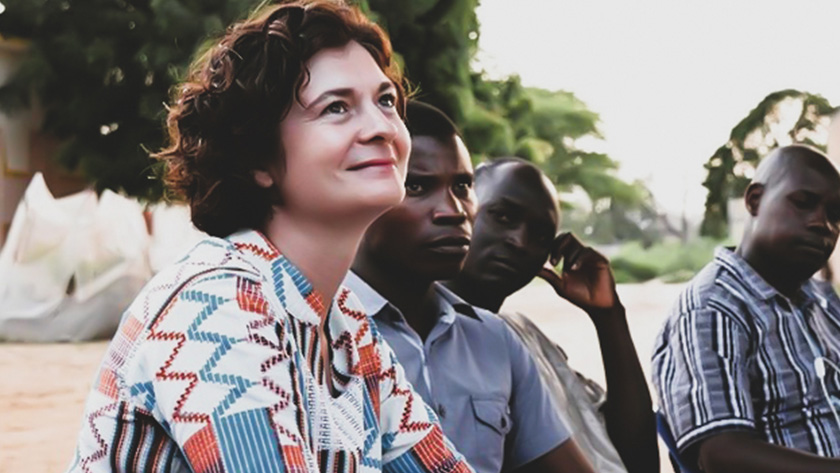 Elena Bonometti participates in a village meeting.
Elena Bonometti participates in a village meeting.
You and Tostan have grown together as a person and an organization, and it was so important for me as a leader succeeding the founder to be strongly aligned with those values and bring a fresh perspective from the management side that promotes wellbeing in the workplace.
We put in place a system that was supportive of staff taking leave, to go on leave comfortably and not feeling guilty. We had to reinforce the value of wellbeing by changing fundamental practices. I think one of the keywords for both of us is intentionality—becoming intentional about wellbeing within the organization.
Molly: It’s so true. We have people who have served for the full 30 years of Tostan’s existence, and somehow struggling and working long nights and weekends was seen as “the cool thing to do” if you wanted to be considered a hard-core development worker. I’ll never forget attending a village meeting until late in the night when, as I drove home, I found one of our supervisors pushing his broken-down motorcycle along the road, coming from another village. I was surprised to see him and asked, “What are you doing out here so late at night?” He looked at me and laughed: “Returning from a village meeting—just like you—on a Saturday night!”
Of course, we value hard work, but after following our individual, and more recently, our organizational wellbeing retreats, we had to help staff—and ourselves—think critically about the importance of taking time off, spending quality time with the family, and getting proper sleep each night. By listening carefully to what individual wellbeing meant to them, we found that things like having a nice place to pray at midday—and organizing the day to prioritize that—was an important wellbeing time for staff. That spiritual wellbeing is critical. Many staff talked about having sessions on meditation, yoga, and other collective social activities. We’ve always been a family at Tostan with great camaraderie, but we weren’t focused on that intentional wellbeing piece, and you really have done a wonderful job of leading that effort, Elena.
Elena: Well, I found a very fertile ground on which I could easily build.
Molly: And It’s not about changing values—it’s about changing practices. The values are eternal, but some of the practices were inherited from 30 years ago when development work meant you were expected to sacrifice, struggle, and be exhausted most of the time!
Elena: Tostan is an African organization with 99 percent African staff—each of the National Coordinators in the five countries where we work are native to those countries. Tostan’s leadership, therefore is predominantly African. Today we have almost 800 staff and all were brought through a two-day consultation around this shift of organizational practices which Molly mentioned earlier. We listened deeply. It was a rare opportunity to share and learn from each other in ways that we can’t often do in the office. It was a wonderful experience.
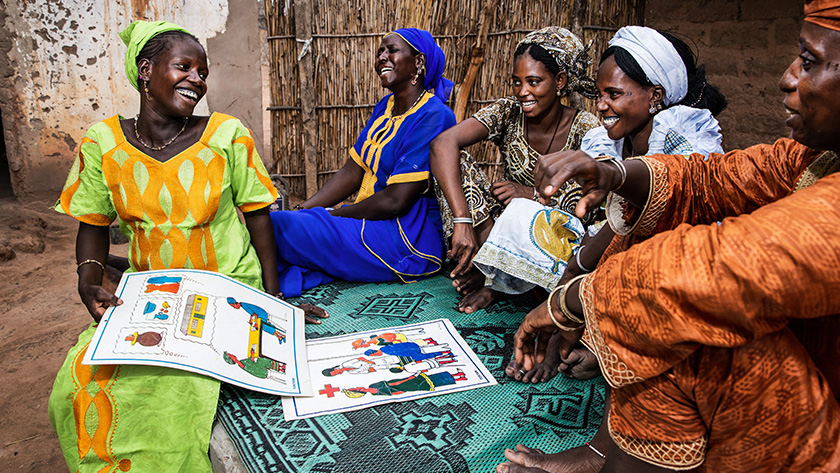 CEP participants review drawings on human rights from their class sessions.
CEP participants review drawings on human rights from their class sessions.
Managing with wellbeing is really making choices that allow people to be in a system that supports them. The staff also began to ask about more opportunities to develop themselves—English classes, training in management, opportunities to develop their potential in a real-world sense. People may think you can’t do this because of constraint of resources, but it was so good for morale, so good for motivation, and far less expensive than high turnover.
Our challenge is also to invest in the new generation to retain those talents who are joining now and who want to develop their career at Tostan. And we have a firm commitment to keep our staff completely intact through this COVID-19 situation.
Molly: It was my dream to have somebody take over like Elena who could take the organization to an even higher level and I think we are on our way. Elena, I think people are looking to you as the leader now and I’m happy about that. You listen so carefully and are willing to make changes when suggested, but I have also seen that you are able to make hard, yet necessary decisions for the good of the organization when necessary.
Elena: This ‘table for two’ style of leadership is unique. When I arrived, Molly, you and the Board had shared with me the article A Table for Two: Can Founders and Successors Co-Exist so Everyone Wins? by Mark Leach. That was a wonderful tool to have, because the model is so well suited for our particular situation at Tostan. I’m the person in charge, and Molly, you and your vision inspire all of us every day. You have so much to give, and that’s one of our greatest assets. This has been a three-year process and little by little, people saw me in action, saw that I had the same values, and that I would bring the organization to the next level.
This is about sustainability of the organization, and the sustainability of leadership. I did an MBA in 2013, and I have a family business that is also going through a transition. I’ve deeply studied successful transitions, particularly for a family business. I think the patterns are similar, and so I felt a lot of empathy for you, Molly, and your personal journey. There are days which are easier and days that aren’t so easy and I needed to respect that. And you’ve respected my position and allowed me to thrive and grow in this role. I’ve not seen many founders doing that.
banner image: Cheikh Mbacké, Tostan Board Chair (2015-19), introduces Elena Bonometti as the new Tostan CEO and Molly Melching with her new title of “Founder and Creative Director” to staff, board members, and community participants at a torch-passing ceremony in Senegal in October, 2017.
Want more stories of transformational change on the world’s most pressing problems? Sign up for Skoll Foundation’s monthly newsletter.
Notifications